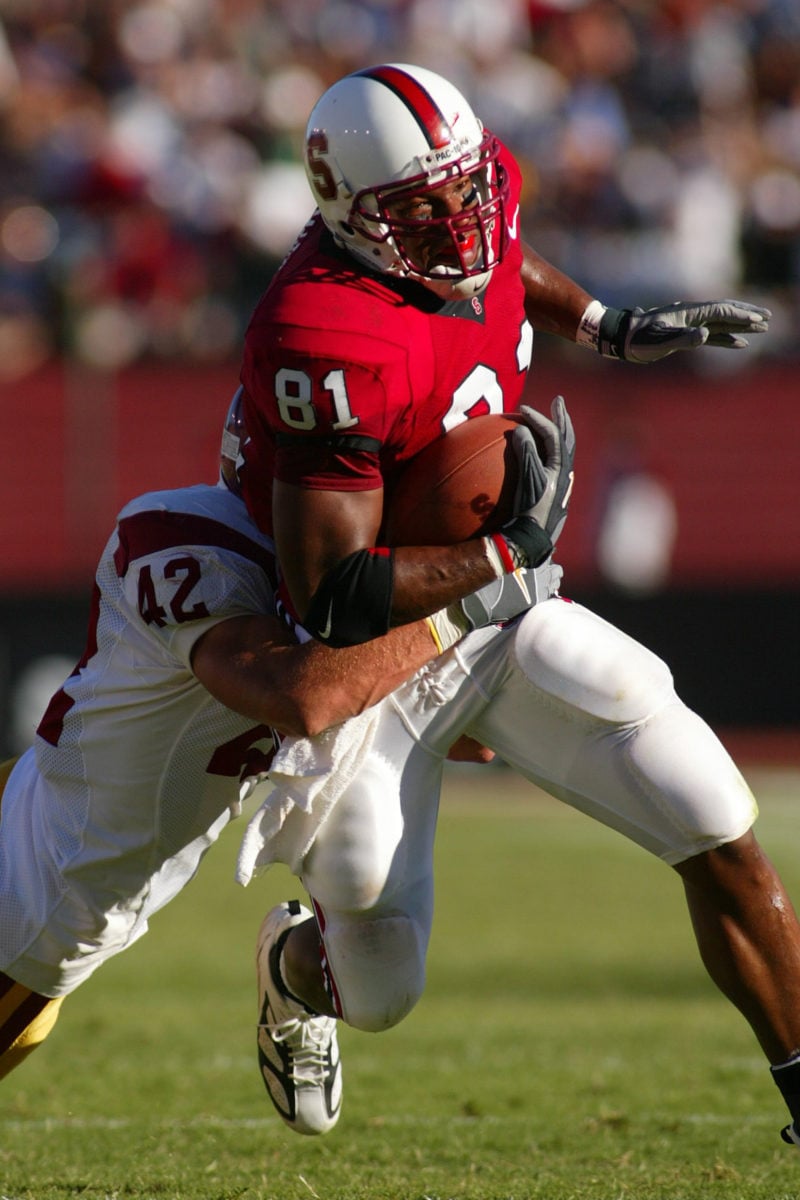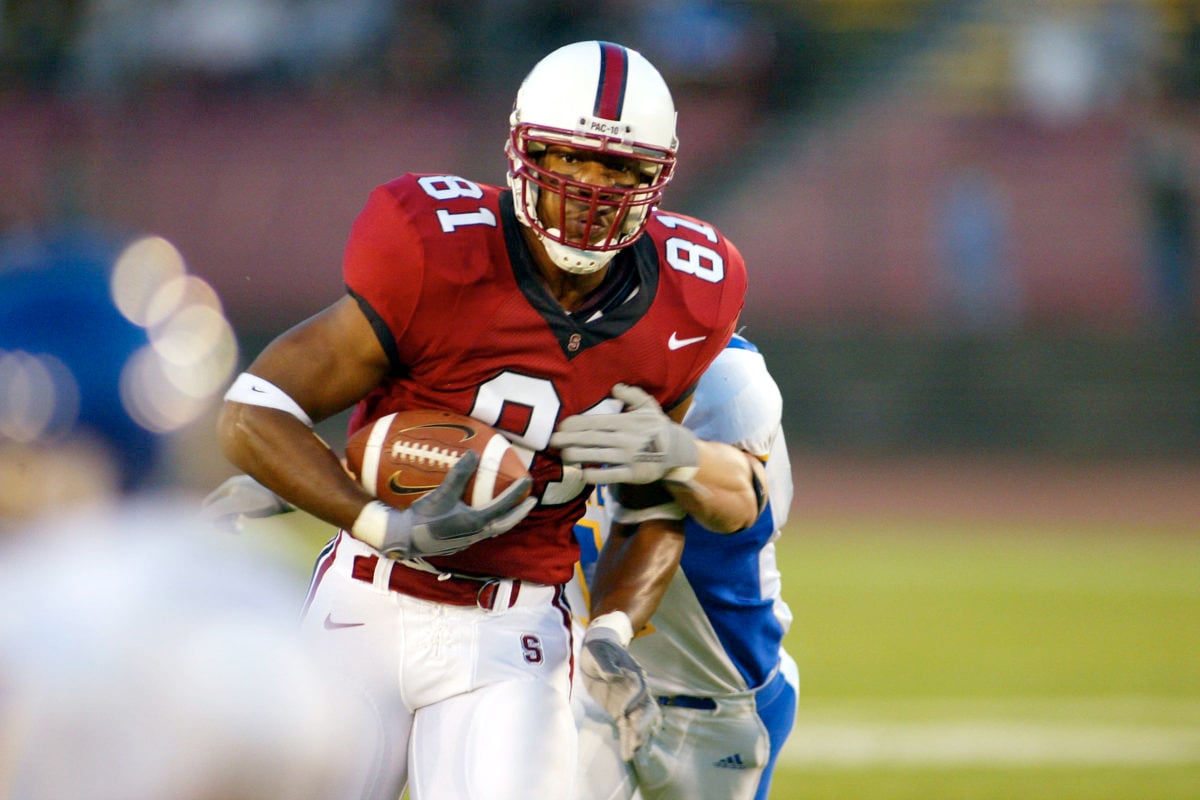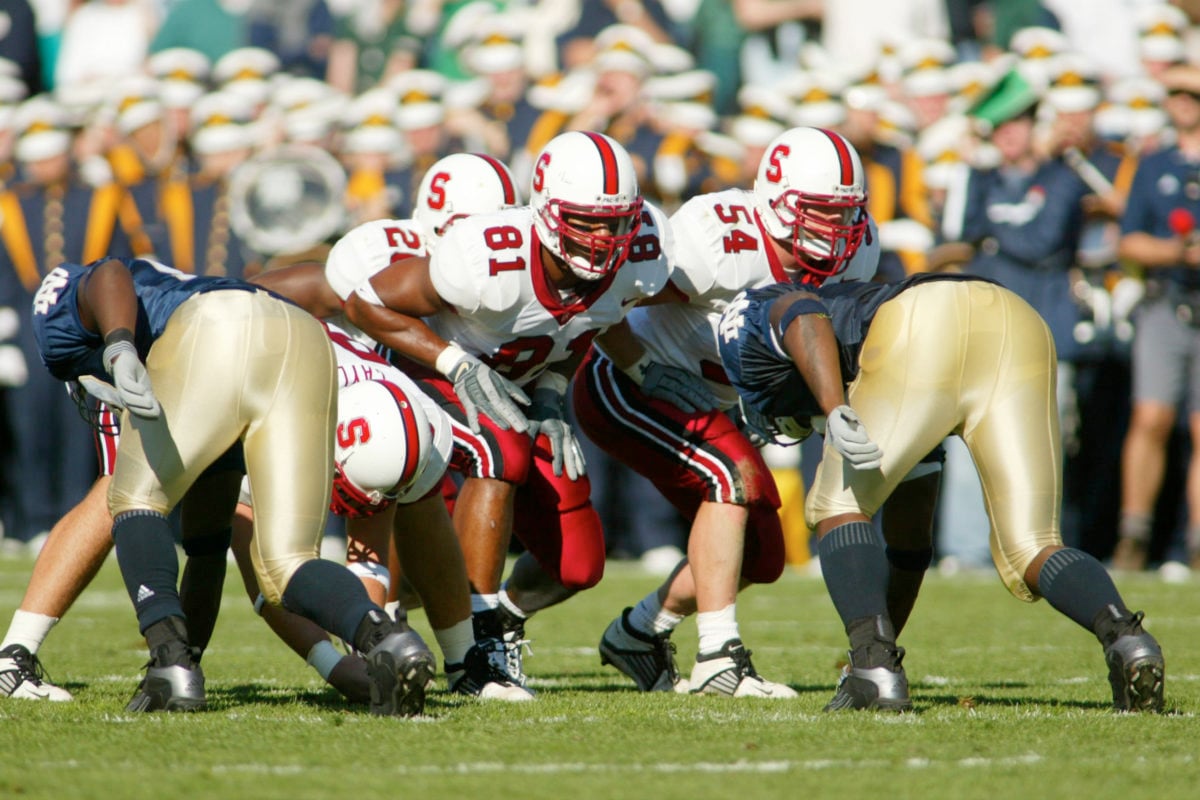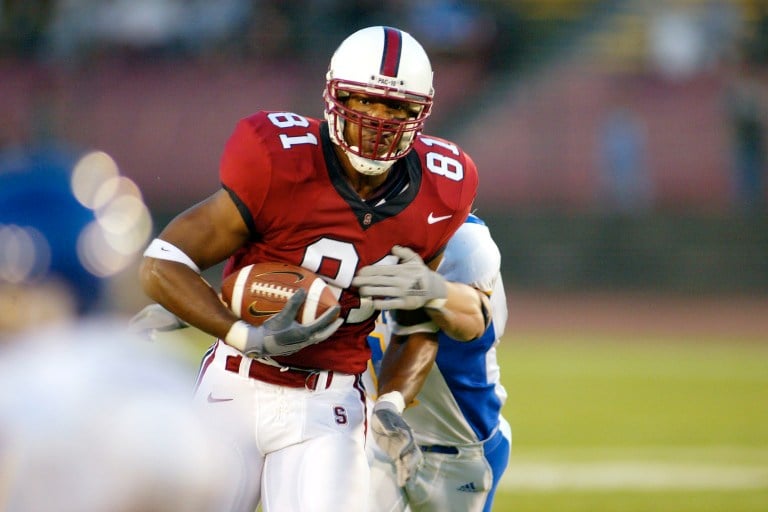It took some time before Alex Smith ’04 was able to convince his parents to let him play football — until high school, to be exact. Despite his comparatively late start, he earned a scholarship to play tight end at Stanford, spent over 10 years in the NFL and recently won his first Super Bowl as a pro scout with the Tampa Bay Buccaneers.
The beginning
Smith’s father, Ed, played in the NFL for about three years before suffering a career-ending knee injury — one of the main reasons his mother was hesitant to let him try the sport.
“I was always one of the taller kids in my class every year, and so she just figured that it’d be a natural inclination for kids smaller than me to attack my knees,” Smith said.
“No matter how much I begged and pleaded,” he recalled, she did not allow him to play. Instead, he played soccer, basketball and lacrosse throughout middle school.
And then, the Denver native went to Mullen High School’s freshman orientation with his mother and ran into his older cousin — a star football player at Mullen — and the football coach.
The coach asked Smith, “Are you gonna play football this year? And I was like, Why not,” Smith explained. “And for whatever reason, [his mother] was like, Yeah, give it a try.”

He followed the traditional rite of passage in high school: starting with the freshman team, he played on the JV team the following year and eventually worked his way up to varsity. But as a junior, he played behind another high school All-American tight end and did not see much playing time until the playoffs, when the starter was injured.
Once he actually saw the field consistently, college coaches took notice, and scholarship offers started rolling in. Stanford was among the schools that offered Smith a full scholarship, and he said his parents were “adamant” about him attending the school.
“If you ask me, I was leaning towards USC or something warmer down there,” he said with a laugh, but he ultimately chose to play for the Cardinal.
While Smith’s first year on the Farm was a successful one — head coach Tyrone Willingham led the team to a 9-3 record, bowl game appearance and No. 16 ranking at season’s end — the team won 10 games combined and did not make another bowl game in his final three seasons under head coach Buddy Teevens. Smith said, however, that on the bright side, he saw more game action at the tight end position rather than just on special teams. The relationships that he was able to develop in and out of Stanford Stadium remain the highlight of his time as a Cardinal, but he said he “could have done without” the lack of winning.
Smith’s senior year was his best season statistically, as he caught 52 passes for 706 yards — an average of 13.6 yards per reception — and scored three touchdowns. He was also named a second-team All-American, was runner-up to the John Mackey Award, which is awarded annually to the best tight end in Division I football, and named Team MVP in 2004. His talent caught the eye of draft scouts, and the Buccaneers drafted him in the third round and 71st overall in the 2005 NFL draft.
During his time at Stanford, Matt Doyle, Senior Associate Athletics Director/Director of Football Operations and Player Development at Stanford, said “the passion that Alex displayed on the field” stood out to him.
“He was a shy guy off the field, but when the whistle blew, he left it all out on the field,” Doyle wrote in an email to The Daily. “He was our leading receiver his senior year but also had a tremendous impact for us during his entire four-year career. Whether it was catching touchdowns or making a key play on special teams, he always played with a tremendous amount of passion and energy.”
The pros
“Right out the gate I remember scoring two touchdowns, setting a franchise record as a rookie in my first game,” Smith said. “I was like, Oh wow, this is easy, but lo and behold I didn’t score the rest of that season.”
As a rookie, he started 10 of 16 games, catching 41 passes for 367 yards and two touchdowns. After spending three more seasons in Tampa Bay, he signed with Philadelphia and played the 2009 season with the Eagles. Then, he spent three years with the Cleveland Browns, two with the Cincinnati Bengals and one final season in 2015 with the Washington Redskins.
Despite not seeing as much playing time as he grew older, former Bengals tight ends coach Jonathan Hayes lauded him for being “such a smart, versatile football player” while mentoring and setting a good example for the younger players.
“Alex could have easily taken the role of the old [veteran] that is only taking the reps that the coach gave him, but instead he would jump in and take scout team reps and set the tone,” Hayes wrote in an email. He would also “show the young guys no tasks were too small or too big.”
“I think I had my best times in Tampa,” Smith said. “That was probably when I was playing the most … we made a couple NFC South titles and made it into the playoffs.”

While he played in four playoff games with three different teams, postseason wins eluded him until 2021: the Buccaneers’ run to the Super Bowl marked Smith’s first four postseason wins.
Smith said he knew his final season would be 2015 if Washington decided not to resign him; he opted against moving his family to a different city and ultimately retired in early 2016. Shortly after his playing career ended, he enrolled in an online scouting academy to brush up his skills in hopes of finding a job as an NFL scout.
The journey to the front office
Coaches took notice of Smith’s inclination to mentor younger players: he said he was asked often if he wanted to coach when he retired.
“I was like, No, no way — you guys are here way too long,” he said. “You’re here before I get here, you’re here after I leave so I was like, No, I don’t want to do any of that.”
Hayes, however, noted that Smith set an example for the younger Bengals players by being one of the first players to show up to the team’s facility each morning as well as one of the last ones to walk out in the evening.
Doyle also remembered the dedication Smith showed to the sport: “From day one at Stanford, Alex was always one of the hardest-working players on our team,” he wrote. “Alex was always one of the ‘first one on and last one off’ the practice field every day, and his work ethic rubbed off on many of his teammates.”
Though coaching did not appeal to him, Smith was interested in pursuing a general manager (GM) role. He said that “constructing a team, putting the pieces together” was appealing and something he would go through in his head as a player: “I was always doing that, like, ‘I wish we’d go get this guy or draft that guy, he’d really help us out,’ so that was a natural thing for me.”
He enrolled in the online scouting course after looking up how GMs get started and realizing most began as scouts.
“There’s really no real shortcuts unless you’re a Hall of Fame guy,” he explained. “For the most part, you’re going to have to put your work in and learn the ropes.”
After completing the online course, he earned an internship with the Buccaneers during training camp in 2016. While scouting can be difficult to learn for someone who did not have any playing background, Smith said it came naturally to him after studying tape and preparing for upcoming opponents as a player. The most challenging part for him, he explained, was “learning the lingo, learning how to write the reports.”
He spent the second half of the 2016 season’s training camp doing another internship with the San Francisco 49ers after wrapping up with the Buccaneers. While he did not receive a full-time offer during the 2016 season, he attended the East-West Shrine Game, a postseason all-star game for college football players, to network and continue to express interest in a scouting position. There, he ran into Buccaneers GM Jason Licht and received an offer to work as a pro scout for Licht’s team a few weeks later, where he began before the 2017 season.
The front office
“It can be a grind.” That’s how Smith described his pro scout role. It’s a year-round job, with a short break in July but an otherwise demanding schedule that requires long hours every day.
But Hayes knew Smith was cut out for the job: “He understands the meaning of work ethic,” Hayes wrote in an email.
Doyle concurred: “Alex’s work ethic and dedication are second to none,” he wrote. “It was clear during his time as a player at Stanford and it was even more clear during his time playing professional football. Seeing him thrive in his ‘post-playing career’ with a championship-winning organization comes as no surprise.”

During the season, Smith is part of a team that scouts upcoming opponents and prepares packages of reports for coaches. The coaches “don’t really have time to go through all that and put all that information down on their own, so it’s kind of like their own little cheat sheets, before they get into their game planning,” he said.
Unlike college scouts, who spend the majority of the season on the road, Smith said pro scouts fly out to upcoming opponents’ games, so they are only on the road for a few days per week. Observing from the press box, the pro scouts keep a careful eye on things like injured players limping off the field, because TV cameras do not always catch and broadcast those things.
In addition, the pro scouts are responsible for keeping tabs on players who are free agents, recently released or recently signed during the season for when injury problems arise.
“Guys are always going to get injured, guys are getting waived, people are taking [players] off your practice squad, you’re trying to continue developing players so there’s a lot of moving pieces week to week, especially with injuries,” he explained. “You’re always flying guys into workouts so that you can have a ready list.”
Despite the grueling work schedule, Smith said he was able to return to Stanford to help with college scouting during a road trip to the Bay Area to also scout the 49ers. In-season college scouting is not one of Smith’s main roles, but the pro scouts occasionally help if the opportunity arises.
“One of the reasons why I have been able to serve as a valuable resource to him is because he takes the time to keep in touch and always tries to visit campus when his job allows,” Doyle wrote.
During the offseason, the scouts’ attention shifts to free agency and, to a lesser extent, the NFL draft. Smith said that he and his colleagues have usually written reports on most players already by the time the offseason rolls around, but they double check to make sure they did not miss any players and also cross-check their reports — “it’s just checks and balances.”
While the long hours are challenging, seeing the players perform well on Sunday’s is the most rewarding part of the job. He said watching from the sidelines makes him feel “helpless” if the team is not doing well, but he is still able to enjoy the wins.
“Even though his role is slightly less [high] profile than Tom Brady’s, we all know the importance of his position when it comes to building a championship-level team,” Doyle wrote.
The championship
Finally, after a season that was all the more challenging due to COVID-19, Smith and the Buccaneers found themselves holding the Lombardi Trophy at Raymond James Stadium in Tampa Bay — becoming the first team to win the Super Bowl at their home stadium.
After 13 seasons without a playoff appearance, Smith said the signing of Brady changed the team’s perspective and mindset.
“We were already thinking about being in the Super Bowl,” he said.
𝗦𝘂𝗽𝗲𝗿 𝗕𝗼𝘄𝗹 𝗖𝗵𝗮𝗺𝗽!
— Stanford Football (@StanfordFball) February 8, 2021
Congrats to former Cardinal TE Alex Smith, an 11-year NFL veteran who is in his fourth season as a pro scout for the @Buccaneers!#GoStanford | #StanfordNFL pic.twitter.com/ye4ZYlLAsL
The NFL canceled the preseason because of COVID-19 concerns, making it more difficult for teams to acclimate to practicing and playing together until the regular season started. The Buccaneers opened the season with a 34-23 loss to the New Orleans Saints and by Week 13, their bye week, sat barely above .500 with a 7-5 record.
But after the bye, the team caught fire to win eight straight, including three straight playoff games on the road before emerging victorious at home in the Super Bowl.
After beating one of Smith’s former teams, Washington, in the Wild Card round, the Buccaneers then beat the Saints, who had crushed the Buccaneers 38-3 in the teams’ Week nine matchup.
“Beating New Orleans … was a big boost for us,” Smith said. “We slayed the dragon.”
The NFC Championship Game saw Tampa Bay jump out to a 28-10 lead early in the third quarter, but three interceptions thrown by Brady allowed Aaron Rodgers and the Green Bay Packers to claw their way back to make the game competitive until the end. The Buccaneers hung on for a 31-26 victory, and Smith said, “to go on the road to Green Bay and play Aaron Rodgers, that was as tough as it gets.”
While most fans expected a Super Bowl between the Kansas City Chiefs’ Patrick Mahomes and Brady to turn into a shootout, the Chiefs offense never got rolling and Tampa Bay coasted to a 31-9 victory to win the franchise’s second Lombardi trophy.
“Most people said [the Super Bowl] wasn’t enjoyable,” Smith said, “but I enjoyed every minute of it. We just rode that wave, and now we’re champions.”
